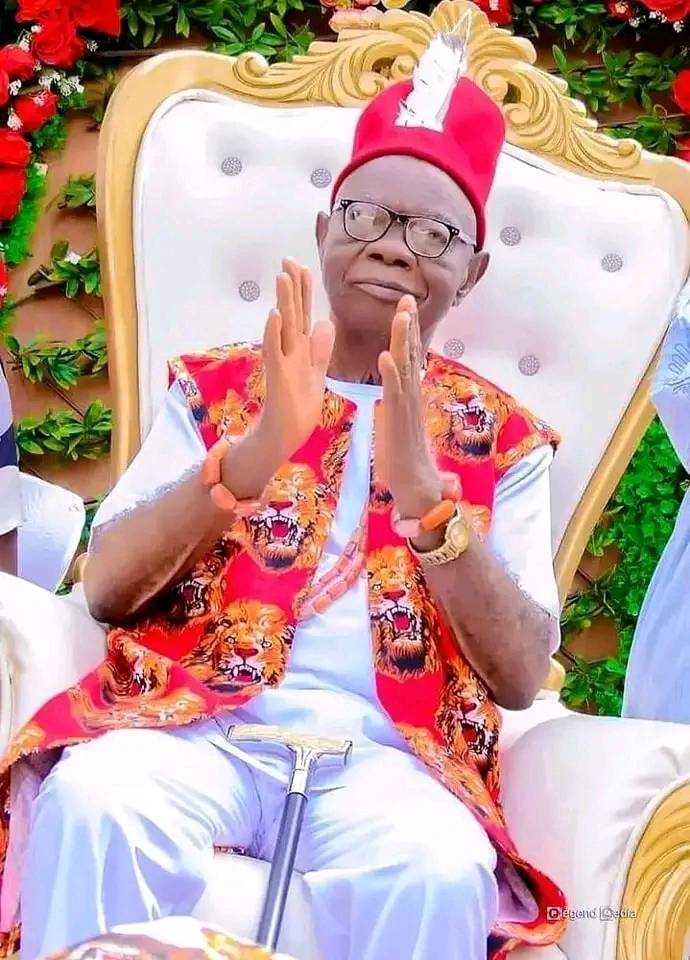
As a child, I heard his song played by my parents. We were also cajoled with his music style whenever our parents think we are beeing silly with our explanations. Our explanations were always followed with; “akuko na egwu Mike Ejeagha”, meaning we were telling long unnecessary story. He was known as “Gentleman,” Ejeagha. He is a distinct storyteller whose guitar-accompanied songs are filled with proverbs, giving his music a didactic style. He writes his own music, with lyrics in the Igbo language.
About Mike Ejeagha
His full name is Mike Ejeagharibe, shortened as Mike Ejeagha. He is a renowned Igbo folklore musician with over 37 Albums and five singles to his credit. His 1960 song “Ofu nwa anaa” shot him to prominence. Ejeagha is a native of Imezi-Owa in Ezeagu LGA of Enugu state. Mike Ejeagha brought glory to Ndigbo and kept the ancient ways of our ancestors alive through his folklore music. In Igbo land, due to his trademark of telling long stories in his music, you would be told “Akụkọ Mike Ejeagha” to a long story. His trending song, “Gwo Gwo Gwo Ngwo”, an excerpt from the original song, Ka Esi Lee Onyeisi Oche, was released 40 years ago. On April 4, 2024, he clocked 94 years.
Mike Ejeagha has showcased an innate talent nurtured under the guidance of a master providence placed in his path in Coal Camp, Enugu. Known widely as Moscow, Moses Aduba lived in the same compound, while his friend Cyprian Uzochiawa would visit for musical practice sessions. Quietly learning in this environment, Ejeagha eventually entered the music scene, boldly choosing to sing exclusively in Igbo and sharing culturally rich stories through his music.
Ejeagha brought a unique essence to the music world. Initially, he might have seemed unremarkable, even provincial. Despite this, he persisted during times when the Igbo community primarily gravitated towards foreign music, and continued through the rise of other indigenous artists. He remained a constant presence.
Over the years, his songs became deeply woven into the fabric of life in Ala Igbo. They became integral to conversations and a metaphor: akuko na egwu Mike Ejeagha. His extensive body of work includes numerous narratives such as Ome ka agu, Atualu Omalu, Suzzana, Udo Ka Nma, Onye Ndidi Neri Azu Ukpo, Obiako Nwam, Akuko N’Egwu, Nwelu Nwayo Sobe Ife Uwa, Nwa Bu Onyinye Chukwu, M jua Gi Izaa, Onye Ori Utaba, and Elulube Lube, among others. What is the True Meaning of Mike Ejeagha’s Song, Gwo Gwo Gwo ngwo?
These songs told stories and imparted moral lessons. In many of them, Ejeagha would often repeat, “Nnam gwara mu,” meaning “My father told me.” This refrain was a traditional way of citing and establishing authenticity.
Title of Mike Ejeagha’s Gwo gwo gwongwo
Incase you do not know know, “gwo gwo gwongwo” is not the title of the main song. It is just a chorus of the song. The title of the song is “Ka esi lee onye isi oche” meaning how the Chairman was deceived and used. The song from Mike Ejiagha is a folktale.
The King had previously informed all the animals in his kingdom that anyone who could bring a big animal such as elephant or cow in tether to the feast would marry his daughter. Now none of the animals could bring the elephant to the feast in rope. But the tortoise had a different idea.
He went to the elephant and informed him that through his (tortoise) effort, the king had approved him (the elephant) to chair the occasion and that he would like to go with him to the ceremony. On their way, the tortoise informed the elephant that he couldn’t walk because he was frail and old.
So, the elephant suggested the tortoise to climb on his back so he could hitch-hike him to the occasion. In the course of the journey, the tortoise suggested to elephant that he needed a rope on the neck of the elephant so that he wont fall down from the top, a request which the elephant obliged.
On the approach to the feast the tortoise climbed down from the back of the elephant and handed the tethered animal to the king and married his daughter. The folktale theme is an attempt by the storyteller (Mike Ejiagha) to elevate intellectual capacity or quality over muscular capacity or quantity.
What is the True Meaning of Mike Ejeagha’s Song, Gwo Gwo Gwongwo
What is the theme or the Moral lessons of “gwo gwo gwongwo” by Mike Ejeagha.
People ask; what lessons can we get from the this trending song gwo gwo gwongwo? There are many lessons to be learnt. Every folktale or folklore has underlining lesson or lessons.
- First is the elevation of intellectual capacity or quality over muscular capacity or quantity as displayed by tortoise over the mighty elephant.
- The second is deception which is the hall mark of the song. The tortoise achieved his mission through deception which it could never achieve if it followed the right means. Deception is evil no matter how it is used, especially if an innocent person is made victim and when it is used for personal selfish gain.
- The last moral lesson, we should be mindful where we follow our friends to. This advice was pointed out by the singer towards the end of the song. He said if your friend tells you to follow him or her to somewhere, you shouldn’t be in a haste to go. Find out if the place leads to a road where you will be sold or exploited.



